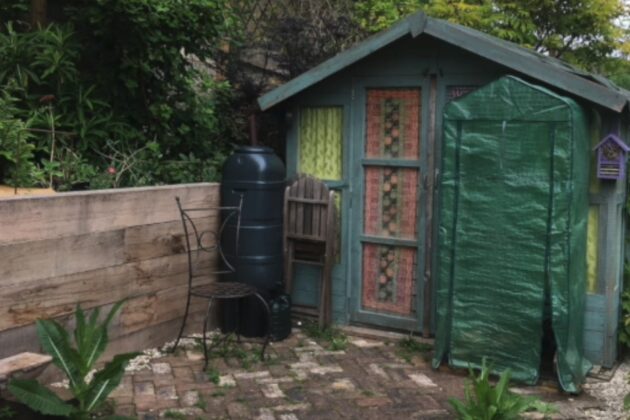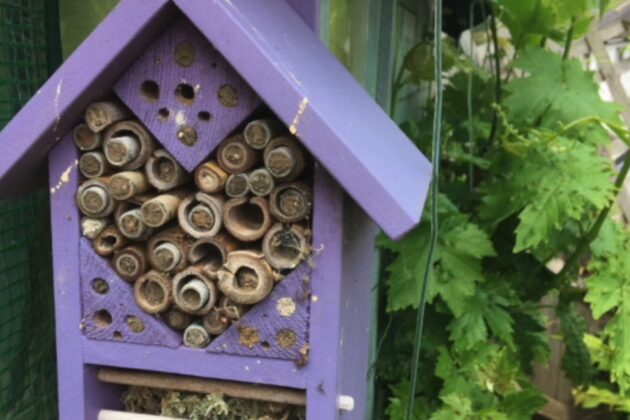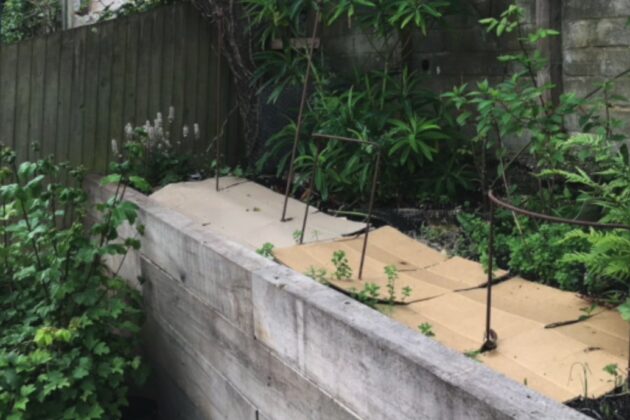We caught up with our Community Orchard Development Worker, Jenni Cresswell about her Permaculture Design Course (PDC) project, what she learned and how permaculture has had an impact on her.

1) Hi Jenni, tell readers a bit about who you are and why you decided to take the Permaculture Design Course?
I started working with Brighton Permaculture Trust as their Community Orchard Development Worker last year and wanted to immerse myself in all things permaculture to really get a feel for the organisation’s values.
2) Can you tell me about the project you chose to work on as part of the course and which principles you worked with the most?
I chose my back garden, a space I had always struggled to like since moving in. This was a classic case of “the problem contains the solution” and took the principles of “Apply self-regulation & accept feedback” and “Creatively use & respond to change” firmly into account in terms of problem-solving; the problem was not so much the garden space as my perception of it.
3) Looking back, which lectures and activities from the course have had the most amount of impact on you? How do use them in your daily life?
The most powerful session for me was also the most surprising. The week on money was emotionally charged for me and got me deep-diving into how to challenge some of my fundamental thinking about what had turned out to be an emotive area for me. I loved all the earth-based science lectures – having completed an environmental degree in the early ’90s, long-forgotten science relating to soil, succussion and land management came flooding back to me – in a good way!
Another unexpected highlight was the session on energy. Being somewhat allergic to DIY, I thought this session would fall into the same category, but I was deeply inspired by the breadth of information about how buildings ‘work’, the implications of inefficiencies and how to address them in small or fundamental ways.


4) What were the particular challenges that you faced and how did you overcome them?
I find groups a challenge at the best of times and whilst participating online allowed for the option to ‘hide’, it also in some ways made it much harder to ‘blend in’ or stay quiet. It took courage and commitment to trust in the course tutors to guide us through the many weeks and I trusted in Brighton Permaculture Trust, with its years of experience to have my wellbeing in mind. The commitment has paid off as subsequent ‘live’ gatherings have cemented the group, generating ongoing collaboration and support.
5) What has been your biggest takeaway(s) from completing the course?
It has been joyful to rediscover the simplicity of the permaculture ethics and principles, while also being reminded that this simplicity belies the complex interconnectedness of those same ethics and principles. I feel better equipped to be part of the trust and apply my understanding practically. Linked to this is a sense of ‘coming home’; finding my place in the world, in my community; having the opportunity to link in with others to be part of a bigger, slower solution to problems we are all experiencing.
6) Has your journey in permaculture impacted other areas of your life, perhaps unexpectedly?
Returning to the money session, I have found myself devouring books and talks on new ways to think about and act with money. This has included; how to authentically embed other economies into my own life, such as gift economies, pay-it-forward principles and the idea that work can allow one to “bow in service”*. The money thing is so surprisingly linked to the community which means I don’t think a day goes by now where I don’t ask the question: what can I do to make this better? Not just for me, but for others. I feel like I’ve been handed my life’s work and as a result, I’ve become a sort of reluctant community participator; not bad for someone who doesn’t like joining new groups!
*Charles Eisenstein’s Sacred Economics
7) What would you say to someone who is looking at this course and isn’t sure if it’s for them?
I would defy anyone to take this course and not learn something new, and not necessarily something about ‘stuff’ (although that too), but something about themselves. And it might not the thing you thought you were going to learn, but it will be the thing you need to learn. So I would say that if you’re not sure, you’ve chosen the right course.
8) Do you have any longer-term permaculture orientated projects in the pipeline?
A. Only the rest of my life! On a serious note, I am privileged in my job to be involved with working with communities to plant trees and as such, I can’t think of a better long term permaculture project to be involved with! Trees will outlive me and bring shade and biodiverse habitats, peace, beauty and food to others long after I’m gone. ‘Pay it forward’ big style!
Watch Jenni’s brilliant video below to see how she got on with her Permaculture Design Course project!
Find out more about Brighton Permaculture Trust’s Permaculture Design Course by clicking here
Volunteering with Brighton Permaculture Trust is a great way to learn more about putting permaculture techniques into practice. Find out more about volunteering with us here.
All photos and the video by Jenni Cresswell.